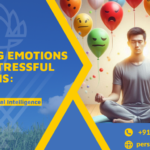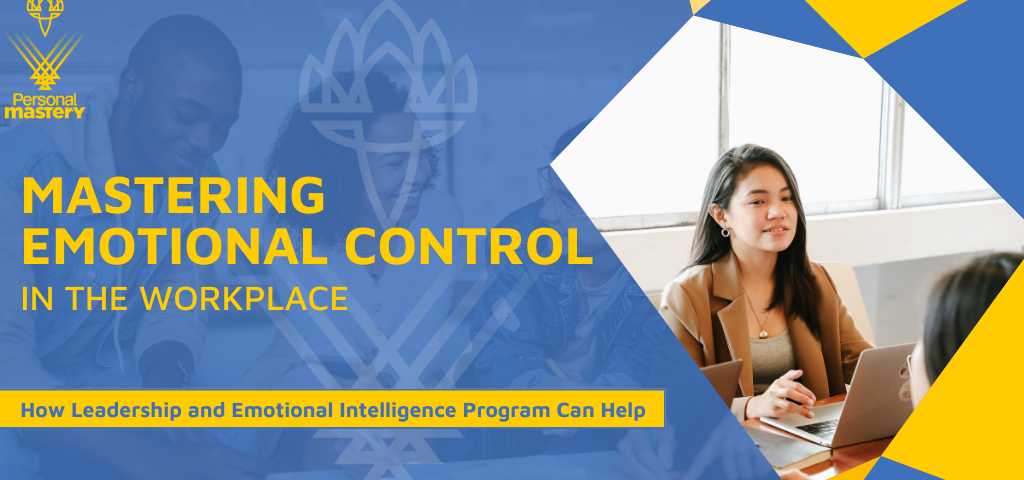
Overcoming Depression from Relationship Issues Using Neuro-Linguistic Programming (NLP)
October 25, 2024
Managing Emotions During Stressful Situations: The Role of Emotional Intelligence
November 12, 2024Introduction
Navigating stressful situations at work can feel overwhelming, especially when emotions take over. Workplaces are essentially high-stakes situations wherein decision-making, communication, and problem-solving skills are constantly tested. While very small, our lesser rationality with rising emotions can mess with our focus, productivity, and even colleague relationships. Learning to manage emotions in such tough moments does not merely help a person feel better. It plays an important role in personal development and career growth. We will explore the significance of emotional regulation at work within the blog, discuss Leadership and Emotional Intelligence Skills Improvement Programs, and how these programs help individuals restore their emotional equilibrium in the workplace.
Understanding Emotional Challenges in the Workplace
Emotions form a natural basis for our daily lives and reactions, responses, and interactions with the outside world. However, the high demands, restricted timelines, and interaction make the workplace more challenging than personal settings for emotional hold. Hence, being unable to control emotions can lead to chaos, stress can slip into anxiety, or burnout, or create conflicts amongst co-workers. Building one’s emotional intelligence would allow for greater self-awareness in addressing their emotions and facilitate healthily taming them.
The Role of Emotional Intelligence in Managing Workplace Stress
Emotional intelligence is the capacity to understand and manage one emotional impulse. When a person has great emotional intelligence, he will remain calm under pressure, sympathize with others, and be able to make rational decisions even under extreme emotional distress. This will allow them to be more flexible when dealing with stress in their personal and professional lives, leading to career enhancement.
Common Emotional Challenges Faced During Stressful Work Situations
- Outbreaks of emotions and responses: The most difficult part of being stressed by the workplace is managing emotional reactions that would arise unanticipatedly. Sometimes, heated discussions or woes can trigger sensations of anger, frustration, or impatience.
- Stress and feelings of anxiety: For some people, work-related stress can create anxiety, especially on demanding projects or when dealing with unfamiliar tasks. Whatever the size of the task, anxiety is detrimental to decision-making and leads to a vicious cycle of stress and productivity-cum-safety.
- Problems of focus and productivity: When emotions run high unchecked, they usually take center stage in one’s thought process, leading to a feeling of lost focus and impaired productivity. Thoughts are clouded with worry or frustration, making concentration difficult.
- Poor relationship with fellow workers: Neglected emotions can give rise to conflicts or situations of miscommunication. Unresolved emotional issues over time will particularly ruin the relationships in the workplace- collaboration or teamwork suffers.
Why Emotional Intelligence Is Essential for Workplace Success
Individuals possessing higher emotional intelligence are said to be integrative, genius, and efficient in communication with others. Thus, the advantages that emerged from the introduction of emotional intelligence into workplaces are many.
- Decision-making capabilities would be enhanced: Since emotional intelligence teaches a person to think in all clarity in certain high-pressure situations, that creates a naturally favorable environment for the making of sound choices.
- The capacity to express oneself: Understanding of their emotions and the ability to read others’ feelings improve communication and compel colleagues beyond the ordinary trust bounds.
- Adaptability: People with strong emotional intelligence adjust to changes better, one of the necessaries in variable contexts of work.
- Leadership ability: High EI mainly is also a reason for the effectiveness of leadership, as it nurtures leaders to pull their teams together through thick and thin.
Main Benefits of Leadership and Emotional Intelligence Programs
- Self-awareness is the Key:
Most emotional intelligence programs put self-awareness at their forefront. Being self-aware of one’s feelings allows individuals to see how their feelings affect their behavior and decisions. Such measures are essential in gaining control over one’s impulsive reactions.
- Techniques for Teaching Stress Management:
Emotional intelligence improvement programs often teach stress management skills to help individuals self-calm in trying situations. Techniques such as slow deep breaths, visualization, and reframing thoughts can all instantaneously reduce one’s stress levels.
- Building Empathy and Understanding the Emotions of Others:
Leadership and emotional intelligence programs move beyond self-regulation to illustrate empathy. Understanding the feelings of others enables him or her to communicate effectively, de-escalate conflicts, and enhance relationships.
- Improving Communication Under Stress:
Most stressful situations generated at the workplace will lead to the breakdown of communication. Programs revisited based on leadership and emotional intelligence teach participants to express themselves in an assertive and relaxed manner during stressful situations. This indeed leads to clarity in communication, collaborative teamwork, and reduced conflict.
- Better Conflict Resolution:
Many of the stressful conflicts in the workplace arise due to misunderstandings. Emotional intelligence education teaches individuals to diffuse conflicts given their understanding of basic emotions, and how this helps resolve misunderstandings through empathetic communication.
- Improvement in Decision-Making Skills:
High-stress conditions lead most often to impulsive decision-making. It is leadership programs that help individuals enhance the emotional poise necessary to make sound and reflective decisions under pressure. This is an invaluable skill in this day and age, especially if there is any thought of ever ascending the leadership ranks.
Quantifiable Results in Real Life: Success Stories of Emotional Intelligence in Action
Many students result in Leadership and Emotional Intelligence Programs and share that their reactions to stressful situations at work have dramatically changed. For example, one manager noted that he could control his emotions during tense meetings and answered thoughtfully instead of retroactively. Credit goes also to an overall improvement in team dynamics and relationships that contribute to a safer and more productive environment.
Case Study: How Emotional Intelligence Skills Changed a Team Leader’s Performance
Apoorva found herself overwhelmed by the demands of her role at a tech company. High-pressure situations, constant decision-making, and tight deadlines left her drained and often led to conflict with her team. After enrolling in a Leadership and Emotional Intelligence Improvement Program, started developing strategies to reduce her stress levels through better interaction with her colleagues. Empathy was found to make Apoorva more supportive, thereby enhancing her overall performance and team cohesion.
The Connection Between Emotional Intelligence and Leadership
Inspiring and leading people is what Leadership is all about and not so much about managing projects. Leadership must inspire the best performance amid emotional crises. One major aspect of effective leadership is emotional intelligence. This refers to the ability to understand each team member and motivate them accordingly. High emotional intelligence in leaders provides the atmosphere wherein one feels valued, understood, and supported, thus, further propelling team productivity and job satisfaction.
Aspiring leaders are enjoying a Leadership and Emotional Intelligence Skills Improvement Program where they can acquire skills that will enable them to manage the emotional requirements for having a leadership role. This is what would equip them to work towards a positive workplace environment wherein team members are inspired and resilient in times of stress.
How to Get Started with an Emotional Intelligence Program
There are a ton of programs available for emotional intelligence, from workshops in-person to a course online. A professional program will offer a supportive venue to apply and practice these skills with some intensive coaching and input. Program content generally includes topics such as stress management, conflict resolution, and empathy development, which will be of interest to anyone wanting to better their performance and emotional well-being.
Choosing the Right Program for You
Some important aspects to look for when choosing an emotional intelligence program are:
- Personalized Coaching: This includes mentorship with these courses, wherein every participant gets assessed and given a framework suited to their requirements.
- Practical Exercises: Real-life scenarios and practical exercises allow people to practice emotional management techniques in a safe and supportive environment.
- Proven Methodology: Look for programs that utilize evidence-based methodologies for emotional intelligence and leadership training.
Conclusion
The ability to keep one’s emotions in check in the workplace is an utmost important skill for career and personal success. The Leadership and Emotional Intelligence Development program allows individuals to develop a proper insight into their emotions, communicate effectively, and build positive rapport with their co-workers. This course stands as an invaluable foundation in emotional intelligence and leadership for someone looking to propel themselves forward career-wise and help them pass through the most challenging work scenarios with calmness and confidence.
Similar to whether you’re growing in your current role or looking forward to leading a team, these skills are a must for advancement. The Affiliated Leadership and Emotional Intelligence Skills Program provides you with suitable guidance and support by Prabhleen Gupta are necessary to develop these competencies. Equipped with expert coaching and practical tools, you will be able to manage stress, make informed choices, and positively contribute to each environment you step into.
Contact Us
Phone: +91-9592877000
Email Id: support@personalmastery.in
Address: #748, Sector 9, Panchkula (Chandigarh), Haryana (INDIA) – 134113
FAQ’s
1. How can emotional intelligence help manage stress in the workplace?
Emotional intelligence (EI) enhances self-awareness, helping individuals recognize and manage their emotions more effectively. With strong EI, employees can handle stress with calmness, stay focused under pressure, and make better decisions, improving overall workplace performance and relationships.
2. What are the key components of a Leadership and Emotional Intelligence Skills Improvement Program?
These programs typically cover self-awareness, emotional regulation, empathy, and effective communication. They provide practical techniques to manage stress, resolve conflicts, and improve team dynamics, which are essential for personal and professional growth.
3. How does emotional intelligence impact teamwork and collaboration?
Emotional intelligence fosters understanding and empathy, which are essential for healthy teamwork. Individuals with high EI communicate more effectively, resolve conflicts calmly, and work better with colleagues, creating a positive and productive workplace atmosphere.
4. Can improving emotional intelligence help with career advancement?
Yes, high emotional intelligence is a key skill for leadership roles. Leaders with EI are better at inspiring and supporting their teams, making informed decisions, and maintaining a balanced perspective under pressure, all of which are critical for career growth.
5. What are some practical techniques taught in emotional intelligence programs for handling workplace stress?
Programs often teach techniques like deep breathing, reframing thoughts, and mindfulness exercises. These techniques help individuals stay calm, focus on solutions, and handle high-stress situations with resilience and clarity.


